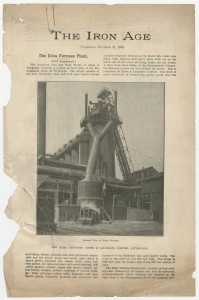By: Evan Ward, UA MA student in History
This post is an update from Evan Ward’s initial research proposal, seen in his first blog post on April 21, 2014. Since then, his work shifted. As many students fear the moment when they realize the need to change the direction of their research, he agreed to discuss both how and why his research changed in an interview and through the summary presented below.
We hope his example will not only enlighten others about the significant work he is doing, but also help demystify the process of refining your topic in response to what sources become available.
My project began with a question that occurred to me while studying constitutional change in Alabama during the era of Democratic Redemption. When redeemers retook the state house in the fall of 1874, they associated industrial development with the profligacy and fiscal irresponsibility of Alabama’s Reconstruction governments, which had left the state deeply in debt. The Redeemers of 1874-1875 forbade state aid to corporations, improvements to infrastructure, and sought to repudiate the state debt to the railroad companies, which would have discouraged future investment in the state.
A quarter-century later, when Alabama’s leading figures gathered to again rewrite the state’s constitution, a marked change had occurred in the thinking of the state’s political elite. The 1901 constitutional convention was composed not just of planters and the sons of planters, but of industrialists and corporate attorneys from the state’s mineral belt as well. On the eve of the convention, one of Alabama’s most prominent statesmen, former Confederate general and eight-term Democratic Congressman Joseph Wheeler, lauded the “great hand-maids of civilization, steel iron and coal,” and further marveled at industry’s capacity as a force “exercised in the support of and in extending the influence of American spirit, determined courage and high civilization.”[1]
Why the change? My project initially sought to understand how Alabama’s industrialists pursued their interests in the political arena during this time. But as I read newspapers and industry pamphlets, I was struck by the fervent language that was employed by industrial boosters. I detected a change in attitudes held regarding the dignity associated with industrial labor, and the fitness of industrial managers and wage-workers alike for participation in public life. Some grew to resent the old economic system, under which the gentlemen planter was seen as the epitome of success. “When we cease to entertain extravagant and erroneous ideas of the social dignity of idleness,” The Birmingham Iron Age opined, “and not till then, will we begin to build up our waste places, as the trite phrase runs.”[2]
Whereas talk of manly honor had once been the province of independent landowners, industrial labor began to accrue a kind of dignity and honor that was its own. Some Alabamians began to see miners and mill workers as playing a special role in the Redemption of the state. Though the South had failed to secure political independence, economic self-sufficiency could prove to be the next best thing. The quicker states like Alabama could industrialize, the quicker they could free themselves from dependence on northern-made products and raw materials. The Birmingham Iron Age again describes the mood of industrial boosters, heaping praise on those working in settings once thought of as degrading:
All honor, we say, to the noble mechanic of our Southern land – the bone and sinew of our country – the stalwart men who run our machine shops, foundries, forges and railroads…One such man is worth a thousand of our well-dressed idlers, even though his pockets be lined with gold and his face brazen with brass. The hope of our country is the industrious mechanic. Without them, our country would be a desert waste.[3]
[1] Montgomery Advertiser, April 28, 1901.
[2] Birmingham Iron Age, February 19, 1874.
[3] Birmingham Iron Age, February 26, 1874.

